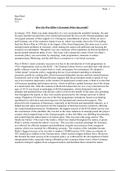Essay
Essay - How Far Was Hitler’s Economic Policy Successful
- Course
- Institution
- Book
In January 1933, Hitler was made chancellor of a very economically unstable Germany. He and his party had thrived amid this crisis which had terrorised the lives on the German populace and owed great amounts of their support to it. During his consolidation of power, Hitler set out to pull Germany o...
[Show more]




